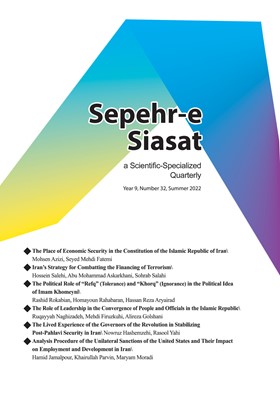The Lived Experience of the Governors of the Revolution in Stabilizing Post-Pahlavi Security in Iran
Subject Areas : Iranian Political ResearchNowruz Hashemzehi 1 * , Rasoul Yahai 2
1 - Assistant Professor, Department of Social Sciences and Communication, Faculty of Humanities, Tehran East Branch, Islamic Azad University, Tehran, Iran
2 - Master's degree, Department of Cultural and Political Studies, Kendokav Social Research Center, Tehran, Iran
Keywords: Crisis, Security, Management, Islamic Revolution, Pahlavi Regime, Governors,
Abstract :
The purpose of the present study is to review the lived experience of the governors in stabilizing post-Pahlavi security in Iran. The approach of the research is qualitative and its strategy is phenomenology. Data collection tool was a semi-structured interview and the sample of study consisted of 10 governors from the first decade of the Islamic revolution who were selected by purposeful sampling based on theoretical saturation. In data analysis, the seven-step process of the Colaizzi method was used. The accuracy of the results was fortified by reviewing and confirming the interview texts by the participants, research colleagues, and with reference to historical documents. Based on the results, provision of machinery, equipment, preparation, emplacement of the fighters and people, accommodating rural refugees inside the cities, political , cultural, industrial, and economic measures for the development of Kurdestan, purging the administrations and selection of employees anew, compensation for the damages of crises, financing and spending excluded budget in the critical regions, and attempt to decrease ethnic conflicts were among the most important lived experiences of the governors in crisis management. The above-mentioned measures were under the influence of the revolution and the revolutionary governors directed their attention to the underprivileged groups and addressed their requests and attracted their forces from the poor neighborhood. Building power institutions from below and consolidation in the structure of power were two strategies that led to the competitor’s expulsion from power and dominance over the security crisis inside the country.
اخوان مفرد، حمیدرضا (1380). ایدئولوژی انقلابی، امام خمینی، احیای تشیع. قبسات، شماره 22.
اسمیت، بریان (1387). دولتسازی در مسائل جهان سوم؛ سیاست در جهان در حال توسعه. ویراسته پیتر برنل و ویکی وندال؛ ترجمه احمد ساعی و سعید میرترابی. تهران: نشر قومس.
بصیری، محمدعلی؛ توکلنیا، مرضیه؛ نجفی، داود (1392). الگوی مدیریت بحران در سیره امام خمینی. پژوهشنامه علوم سیاسی، 9(1)، ص 117-138.
خواجه سروی، غلامرضا (1382). رقابت سیاسی و ثبات سیاسی در جمهوری اسلامی ایران. تهران: مرکز اسناد انقلاب اسلامی.
رحیمی، حسین (1361). انقلاب اسلامی و نهادهای انقلابی. دانشگاه انقلاب، شماره 15.
زارع میرکآبادی، غلامعباس (1395). مدیران جمهوری اسلامی ایران، با تأکید بر مدیران دوران دفاع مقدس. تهران: انتشارات پیک علوم.
سلطانینژاد، ایوب؛ سلطانینژاد، امیر (1394). بررسی نقش مدیریت بحران در کاهش آسیبپذیری خرده نظامهای اجتماعی جنگ ایران و عراق. سیاست دفاعی، 23(92)، ص 191-218.
عابدی، زیبا؛ کشاورز شکری، عباس (1396). زمینه و بسترهای فکری، ساختاری و کارگزاری ایجاد سازمان کمیتههای انقلاب اسلامی ایران. جامعهشناسی سیاسی جهان اسلام، 5(11)، ص 123-148.
عابدی، حیدرعلی (1389). کاربرد روش تحقیق پدیدهشناسی در علوم بالینی. راهبرد، 19(54)، ص 224-207.
محمدپور، احمد (1394). روش تحقیق کیفی ضد روش. تهران: طیف نگار، ج1.
مصلینژاد، عباس (۱۳۹۱). مدیریت بحران در منازعات منطقهای؛ مطالعه موردی جنگ تحمیلی. مطالعات توسعه اجتماعی ایران، 5(1).
میرترابی، سعید (1397). تحلیل روند دولتسازی در ایران پس از انقلاب اسلامی از منظر نهادگرایی تاریخی. جامعهشناسی سیاسی ایران، 1(1)، ص 27-51.
هانتینگتون، ساموئل (۱۳۷۵). سامان سیاسی در جوامع دستخوش دگرگونی. ترجمه محسن ثلاثی. تهران: نشر علم.
Leininger, M. & McFarland, M.R. (2002). Transcultural Nursing. 3rd.ed. New York: MC Graw-Hill, Medical Pub.
_||_
